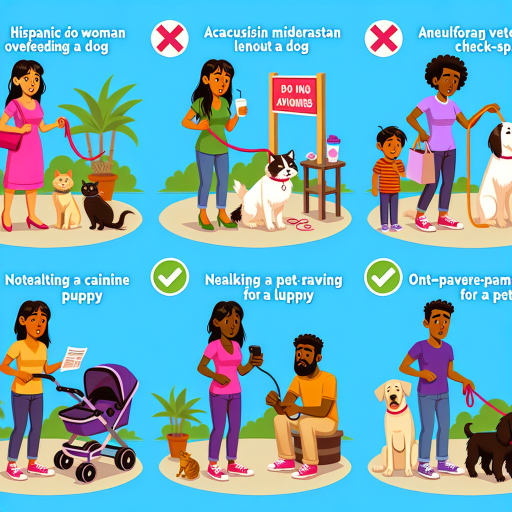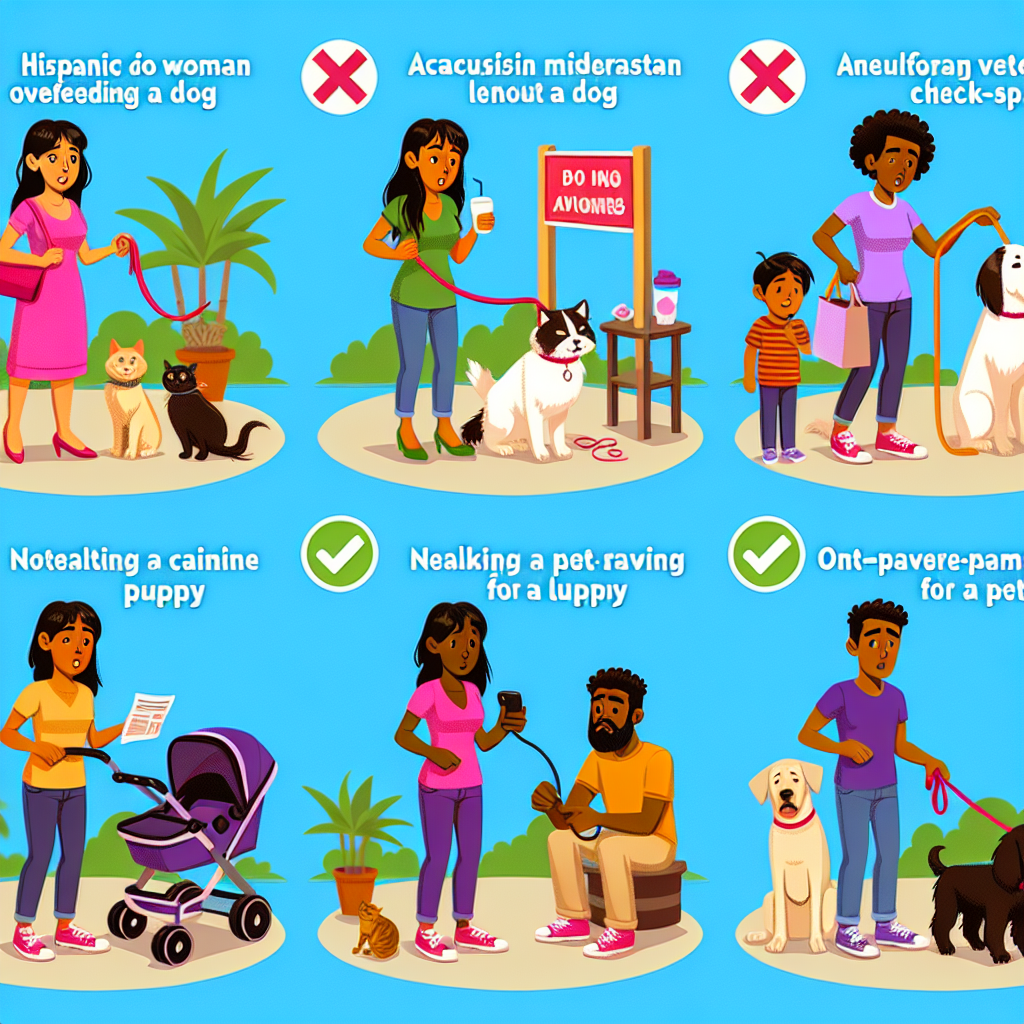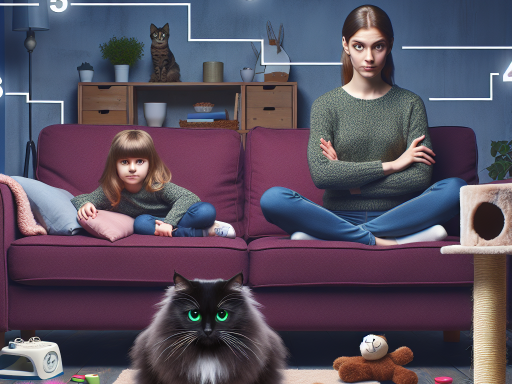Humans aren’t born knowing how to ride a bike or drive a car – we have to learn these skills through proper training. The same goes for our furry friends! Providing proper training is essential in ensuring that your pet is well-behaved, happy, and safe.
Imagine bringing home a new puppy or adopting a rescue dog without teaching them basic commands like sit, stay, or come. It can quickly become chaotic and frustrating for both you and your pet. Training is not just about teaching your dog to perform tricks; it’s about setting boundaries, establishing communication, and building a strong bond with your furry companion.
Training your pet should start from day one. Whether you have a puppy, an adult dog, or even a senior dog, it’s never too late to start training. Basic obedience training can help prevent behavioral issues like excessive barking, jumping on guests, or chewing on furniture. It can also make daily tasks like walking on a leash, going to the vet, or being left alone much easier.
When it comes to training, consistency is key. Make sure to set clear, achievable goals and stick to a routine. Use positive reinforcement techniques like treats, praise, or playtime to reward good behavior and ignore or redirect unwanted behavior. Remember, patience and understanding are crucial – your pet is learning just like you are.
If you’re not sure where to start, consider enrolling in a training class or hiring a professional trainer. They can provide guidance, support, and personalized training plans tailored to your pet’s needs. Online resources, books, and videos can also be helpful tools in your training journey.
By investing time and effort into proper training, you’re not only shaping your pet’s behavior but also strengthening your relationship. Training should be a fun and rewarding experience for both you and your furry friend. So grab some treats, a clicker, and get started on your training journey today!
—
Heading II: Neglecting Regular Vet Check-ups
Regular vet check-ups are crucial in maintaining your pet’s health and well-being. Just like us, pets need routine medical care to prevent and detect any potential issues early on. Neglecting regular vet visits can have serious consequences for your furry friend.
Sure, let’s talk about the importance of heading II: Neglecting Regular Vet Check-ups.
Hey there, pet parents! We all want our furry friends to be healthy and happy, right? Well, one crucial way to ensure that is by making sure they get regular check-ups at the vet. Just like us humans, our pets need to see a healthcare professional to stay in tip-top shape.
So, why is it so important to take your pet for regular vet visits? Well, first and foremost, it allows the vet to catch any potential health issues early on. Our pets can’t tell us when something is wrong, so it’s up to the vet to do a thorough examination and run any necessary tests to make sure they’re healthy.
Regular vet check-ups also give you the opportunity to discuss any concerns or questions you may have about your pet’s health. Whether it’s about their diet, exercise routine, behavior, or anything else, the vet is there to help answer your questions and provide guidance.
Another crucial aspect of regular vet check-ups is keeping up with preventative care. This includes things like vaccinations, parasite control, and dental care. By staying on top of these preventative measures, you can help protect your pet from illnesses and keep them feeling their best.
Now, I know that vet visits can sometimes be stressful for both you and your pet. But, trust me, it’s worth it in the long run. Building a relationship with a vet you trust and feel comfortable with can make the process much smoother. And remember, your vet is there to help your pet, so don’t be afraid to ask questions or voice any concerns you may have.
So, pet parents, let’s make a commitment to scheduling those regular vet check-ups for our furry friends. It’s a small investment of time and money that can make a big difference in your pet’s overall health and well-being. Your pet will thank you for it!
Now, go ahead and pick up the phone to schedule that vet appointment. Your pet’s health is worth it!
—
Neglecting Regular Vet Check-ups
Hey there, pet parents! We all want our furry friends to be healthy and happy, right? Well, one crucial way to ensure that is by making sure they get regular check-ups at the vet. Just like us humans, our pets need to see a healthcare professional to stay in tip-top shape.
So, why is it so important to take your pet for regular vet visits? Well, first and foremost, it allows the vet to catch any potential health issues early on. Our pets can’t tell us when something is wrong, so it’s up to the vet to do a thorough examination and run any necessary tests to make sure they’re healthy.
Regular vet check-ups also give you the opportunity to discuss any concerns or questions you may have about your pet’s health. Whether it’s about their diet, exercise routine, behavior, or anything else, the vet is there to help answer your questions and provide guidance.
Another crucial aspect of regular vet check-ups is keeping up with preventative care. This includes things like vaccinations, parasite control, and dental care. By staying on top of these preventative measures, you can help protect your pet from illnesses and keep them feeling their best.
Now, I know that vet visits can sometimes be stressful for both you and your pet. But, trust me, it’s worth it in the long run. Building a relationship with a vet you trust and feel comfortable with can make the process much smoother. And remember, your vet is there to help your pet, so don’t be afraid to ask questions or voice any concerns you may have.
So, pet parents, let’s make a commitment to scheduling those regular vet check-ups for our furry friends. It’s a small investment of time and money that can make a big difference in your pet’s overall health and well-being. Your pet will thank you for it!
Now, go ahead and pick up the phone to schedule that vet appointment. Your pet’s health is worth it!
So, you’ve got a furry friend at home, huh? That’s awesome! But have you ever wondered if you might be overfeeding or underfeeding your pet without even realizing it? Let’s talk about it.
Feeding your pet the right amount of food is crucial for their overall health and well-being. Just like us, our pets need a balanced diet to stay healthy and active. However, it can be easy to unintentionally overfeed or underfeed them if we’re not careful.
Let’s break it down a little. Overfeeding your pet can lead to obesity, which can pose serious health risks such as diabetes, heart disease, and joint problems. On the other hand, underfeeding can result in malnutrition and can also lead to various health issues. So, finding the right balance is key!
Here are a few tips to help you ensure you’re feeding your pet just the right amount:
1. **Consult your vet**: Your veterinarian is your best ally when it comes to determining the proper diet for your pet. They can give you valuable advice on the right type and amount of food based on your pet’s age, size, breed, and activity level.
2. **Follow the feeding guidelines**: Most pet food packages come with feeding guidelines based on your pet’s weight. Make sure to follow these recommendations and adjust as needed. Remember, every pet is different, so it’s essential to tailor their diet to their individual needs.
3. **Monitor their weight**: Keep an eye on your pet’s weight and body condition regularly. If you notice any sudden changes, it could be a sign that you need to adjust their diet. Your vet can help you determine the ideal weight for your pet and create a feeding plan to achieve it.
4. **Avoid feeding table scraps**: While it may be tempting to give your pet a little treat from your plate, it’s best to stick to their regular food. Table scraps can be high in calories and unhealthy for your pet. Stick to their balanced diet to keep them healthy and happy.
Remember, proper nutrition is the foundation of your pet’s health. By feeding them the right amount of food and providing them with a balanced diet, you can help them live a long and happy life by your side!
Now that you know a bit more about overfeeding and underfeeding your pet, go ahead and check their diet to ensure you’re on the right track. Your furry friend will thank you for it!
“`html
Feeding your pet the right amount of food is crucial for their overall health and well-being. Just like us, our pets need a balanced diet to stay healthy and active. However, it can be easy to unintentionally overfeed or underfeed them if we’re not careful.
Here are a few tips to help you ensure you’re feeding your pet just the right amount:
- Consult your vet: Your veterinarian is your best ally when it comes to determining the proper diet for your pet.
- Follow the feeding guidelines: Most pet food packages come with feeding guidelines based on your pet’s weight.
- Monitor their weight: Keep an eye on your pet’s weight and body condition regularly.
- Avoid feeding table scraps: While it may be tempting to give your pet a little treat from your plate, it’s best to stick to their regular food.
“`
Lack of Exercise and Mental Stimulation
Hey there, pet parents! Let’s talk about the importance of exercise and mental stimulation for your furry friend. We all know that our pets need physical activity to stay healthy, but did you know that mental stimulation is just as crucial for their overall well-being?
Just like us, our pets need to exercise to maintain a healthy weight, strengthen their muscles, and keep their hearts pumping. But beyond just physical benefits, regular exercise can also help prevent behavioral issues like boredom, anxiety, and even aggression. A tired pet is a happy pet!
So, how can you make sure your pet is getting enough exercise? It’s simple – just take them for a walk, play fetch in the backyard, or even set up an obstacle course for them to navigate. Not only will your pet benefit from the physical activity, but bonding with them during playtime will strengthen your relationship too.
Now, let’s not forget about mental stimulation. Just like humans, pets need mental exercise to keep their minds sharp and engaged. Boredom can lead to destructive behaviors like chewing on furniture or excessive barking, so it’s crucial to provide your pet with activities that challenge their brains.
One easy way to stimulate your pet mentally is through interactive toys and puzzles. These toys are designed to keep your pet entertained and engaged, providing mental stimulation that can prevent boredom and promote a healthy mind.
Another great way to keep your pet mentally stimulated is through training sessions. Teaching your pet new tricks not only boosts their confidence but also helps keep their minds active and engaged. Plus, training sessions are a great bonding opportunity for you and your furry friend.
So, pet parents, remember that exercise and mental stimulation are just as important as proper nutrition and regular vet check-ups. By incorporating these activities into your pet’s daily routine, you can ensure that they lead a happy, healthy, and fulfilling life.
“`html
Lack of Exercise and Mental Stimulation
Hey there, pet parents! Let’s talk about the importance of exercise and mental stimulation for your furry friend. We all know that our pets need physical activity to stay healthy, but did you know that mental stimulation is just as crucial for their overall well-being?
Just like us, our pets need to exercise to maintain a healthy weight, strengthen their muscles, and keep their hearts pumping. But beyond just physical benefits, regular exercise can also help prevent behavioral issues like boredom, anxiety, and even aggression. A tired pet is a happy pet!
So, how can you make sure your pet is getting enough exercise? It’s simple – just take them for a walk, play fetch in the backyard, or even set up an obstacle course for them to navigate. Not only will your pet benefit from the physical activity, but bonding with them during playtime will strengthen your relationship too.
Now, let’s not forget about mental stimulation. Just like humans, pets need mental exercise to keep their minds sharp and engaged. Boredom can lead to destructive behaviors like chewing on furniture or excessive barking, so it’s crucial to provide your pet with activities that challenge their brains.
One easy way to stimulate your pet mentally is through interactive toys and puzzles. These toys are designed to keep your pet entertained and engaged, providing mental stimulation that can prevent boredom and promote a healthy mind.
Another great way to keep your pet mentally stimulated is through training sessions. Teaching your pet new tricks not only boosts their confidence but also helps keep their minds active and engaged. Plus, training sessions are a great bonding opportunity for you and your furry friend.
So, pet parents, remember that exercise and mental stimulation are just as important as proper nutrition and regular vet check-ups. By incorporating these activities into your pet’s daily routine, you can ensure that they lead a happy, healthy, and fulfilling life.
“`Heading V: Ignoring Grooming and Hygiene
Hey there, pet parents! Let’s talk about the importance of grooming and hygiene for your furry friend. Just like us humans, our pets need regular grooming to keep them healthy and happy. Neglecting this aspect of their care can lead to a variety of issues, from skin infections to mats in their fur. So, let’s dive into why grooming and hygiene are essential for your pet’s well-being.
First off, grooming isn’t just about making your pet look cute (although they always do!). It’s crucial for maintaining their overall health. Regular brushing helps to remove loose fur, dirt, and mats, preventing skin irritation and potential infections. It also helps distribute natural oils in their coat, keeping it shiny and healthy. Plus, who doesn’t love a good belly rub during a brushing session?
Trimming your pet’s nails is another important aspect of grooming. Overgrown nails can be painful for your pet and may even cause them to alter their gait, leading to joint issues. Regular nail trims not only prevent this but also reduce the risk of your pet getting their nails caught in carpet or furniture.
Bathing your pet is also key to their hygiene. Depending on their breed and lifestyle, your pet may need a bath every few weeks or months. Be sure to use pet-safe shampoos and conditioners to avoid skin irritation. And of course, don’t forget to dry them thoroughly to prevent any moisture-related skin problems.
Regular grooming sessions also give you the opportunity to check for any lumps, bumps, or skin issues that may need veterinary attention. Early detection is crucial for successful treatment, so don’t skip these important check-ins with your furry friend.
Now, let’s talk about dental care. Just like us, pets need their teeth brushed regularly to prevent plaque and tartar buildup. Dental issues can lead to pain, infection, and even organ damage if left untreated. So, make sure to invest in pet-friendly toothbrushes and toothpaste to keep those pearly whites sparkling.
And last but not least, don’t forget about your pet’s ears and eyes. Regularly cleaning their ears can prevent infections, while keeping their eyes clear of discharge and debris is essential for their comfort and health.
In conclusion, grooming and hygiene are vital aspects of caring for your pet. By incorporating regular grooming sessions into your routine, you’re not only keeping them looking their best but also ensuring their overall well-being. So, grab that brush, nail trimmer, and toothbrush, and show your furry friend some love with a little grooming session. They’ll thank you with wagging tails and purrs of appreciation!
Remember, a happy and healthy pet starts with good grooming habits. Keep up the great work, pet parents!
Output:
“`html
Hey there, pet parents! Let’s talk about the importance of grooming and hygiene for your furry friend. Just like us humans, our pets need regular grooming to keep them healthy and happy. Neglecting this aspect of their care can lead to a variety of issues, from skin infections to mats in their fur. So, let’s dive into why grooming and hygiene are essential for your pet’s well-being.
First off, grooming isn’t just about making your pet look cute (although they always do!). It’s crucial for maintaining their overall health. Regular brushing helps to remove loose fur, dirt, and mats, preventing skin irritation and potential infections. It also helps distribute natural oils in their coat, keeping it shiny and healthy. Plus, who doesn’t love a good belly rub during a brushing session?
Trimming your pet’s nails is another important aspect of grooming. Overgrown nails can be painful for your pet and may even cause them to alter their gait, leading to joint issues. Regular nail trims not only prevent this but also reduce the risk of your pet getting their nails caught in carpet or furniture.
Bathing your pet is also key to their hygiene. Depending on their breed and lifestyle, your pet may need a bath every few weeks or months. Be sure to use pet-safe shampoos and conditioners to avoid skin irritation. And of course, don’t forget to dry them thoroughly to prevent any moisture-related skin problems.
Regular grooming sessions also give you the opportunity to check for any lumps, bumps, or skin issues that may need veterinary attention. Early detection is crucial for successful treatment, so don’t skip these important check-ins with your furry friend.
Now, let’s talk about dental care. Just like us, pets need their teeth brushed regularly to prevent plaque and tartar buildup. Dental issues can lead to pain, infection, and even organ damage if left untreated. So, make sure to invest in pet-friendly toothbrushes and toothpaste to keep those pearly whites sparkling.
And last but not least, don’t forget about your pet’s ears and eyes. Regularly cleaning their ears can prevent infections, while keeping their eyes clear of discharge and debris is essential for their comfort and health.
In conclusion, grooming and hygiene are vital aspects of caring for your pet. By incorporating regular grooming sessions into your routine, you’re not only keeping them looking their best but also ensuring their overall well-being. So, grab that brush, nail trimmer, and toothbrush, and show your furry friend some love with a little grooming session. They’ll thank you with wagging tails and purrs of appreciation!
Remember, a happy and healthy pet starts with good grooming habits. Keep up the great work, pet parents!
“`Heading VI: Not Setting Boundaries or Rules
Hey there, pet parents! Today, let’s talk about the importance of setting boundaries and rules for your furry friend. Just like us, our pets thrive when they know what is expected of them. Without clear guidelines, they can become confused and anxious, leading to behavioral issues that can be challenging to address.
1. Establishing boundaries: Setting boundaries helps your pet understand what is acceptable behavior and what is not. Whether it’s staying off the furniture, not begging at the dinner table, or respecting personal space, consistency is key. Communicate these boundaries clearly and reinforce them with positive reinforcement when your pet follows them.
2. Implementing rules: Rules provide structure and routine for your pet, which can help reduce stress and anxiety. Whether it’s meal times, potty breaks, or playtime, having a schedule in place can make your pet feel secure and confident. Be sure to stick to these rules as much as possible to create a sense of stability for your furry friend.
3. Using positive reinforcement: When your pet follows the boundaries and rules you’ve set, be sure to reward them with praise, treats, or playtime. Positive reinforcement is a powerful tool in training and can help reinforce good behavior. Remember, consistency is key, so be sure to reward your pet every time they do what you ask.
4. Avoiding punishment: While it’s important to correct undesirable behavior, it’s equally important to avoid harsh punishment. Using positive reinforcement to encourage good behavior is much more effective than punishing your pet for mistakes. Punishment can lead to fear and anxiety, which can have a negative impact on your pet’s well-being.
5. Seeking professional help: If you’re struggling to set boundaries and rules for your pet, don’t hesitate to seek help from a professional trainer or behaviorist. They can provide guidance and support to help you establish a healthy and positive relationship with your furry friend.
Remember, setting boundaries and rules for your pet is essential for their well-being and your peace of mind. By establishing clear guidelines, using positive reinforcement, and seeking help when needed, you can create a harmonious and happy home for both you and your furry companion. So, go ahead and set those boundaries – your pet will thank you for it!
Now, go give your furry friend a pat on the head and a treat for being such a good listener. And don’t forget to reinforce those boundaries and rules with love and patience. Happy training, pet parents!
“`html
Heading VI: Not Setting Boundaries or Rules
Hey there, pet parents! Today, let’s talk about the importance of setting boundaries and rules for your furry friend. Just like us, our pets thrive when they know what is expected of them. Without clear guidelines, they can become confused and anxious, leading to behavioral issues that can be challenging to address.
- Establishing boundaries: Setting boundaries helps your pet understand what is acceptable behavior and what is not. Whether it’s staying off the furniture, not begging at the dinner table, or respecting personal space, consistency is key. Communicate these boundaries clearly and reinforce them with positive reinforcement when your pet follows them.
- Implementing rules: Rules provide structure and routine for your pet, which can help reduce stress and anxiety. Whether it’s meal times, potty breaks, or playtime, having a schedule in place can make your pet feel secure and confident. Be sure to stick to these rules as much as possible to create a sense of stability for your furry friend.
- Using positive reinforcement: When your pet follows the boundaries and rules you’ve set, be sure to reward them with praise, treats, or playtime. Positive reinforcement is a powerful tool in training and can help reinforce good behavior. Remember, consistency is key, so be sure to reward your pet every time they do what you ask.
- Avoiding punishment: While it’s important to correct undesirable behavior, it’s equally important to avoid harsh punishment. Using positive reinforcement to encourage good behavior is much more effective than punishing your pet for mistakes. Punishment can lead to fear and anxiety, which can have a negative impact on your pet’s well-being.
- Seeking professional help: If you’re struggling to set boundaries and rules for your pet, don’t hesitate to seek help from a professional trainer or behaviorist. They can provide guidance and support to help you establish a healthy and positive relationship with your furry friend.
Remember, setting boundaries and rules for your pet is essential for their well-being and your peace of mind. By establishing clear guidelines, using positive reinforcement, and seeking help when needed, you can create a harmonious and happy home for both you and your furry companion. So, go ahead and set those boundaries – your pet will thank you for it!
Now, go give your furry friend a pat on the head and a treat for being such a good listener. And don’t forget to reinforce those boundaries and rules with love and patience. Happy training, pet parents!
“`
The Importance of Socialization for Your Pet
Hey there pet parents! Today, let’s chat about the crucial aspect of socialization for your furry friends. Just like us, our pets need social interaction to thrive and lead happy, healthy lives.
Socialization is not just about your pet meeting other animals; it’s also about exposing them to different environments, sounds, and experiences. This helps them become well-adjusted and confident beings, able to handle various situations with ease.
Why is socialization important?
Proper socialization helps prevent behavioral issues such as aggression, fearfulness, and anxiety in pets. It also improves their communication skills with other animals and humans, making them better companions. Socialized pets are more relaxed, adaptable, and enjoyable to be around.
How to socialize your pet:
Start socializing your pet from a young age, but remember that it’s never too late to begin. Introduce them to different people, animals, and environments gradually, ensuring that the experiences are positive and rewarding for them.
- Take your pet to obedience classes or training sessions to help them learn how to interact with others in a controlled environment.
- Arrange playdates with other pets to encourage healthy social interactions and bonding.
- Expose your pet to various sounds, sights, and smells to desensitize them and build their confidence.
- Regular outings to parks, pet-friendly stores, and cafes can also provide excellent socialization opportunities.
Signs of a well-socialized pet:
When your pet is well-socialized, you’ll notice that they are calm and relaxed in new situations, interact positively with other animals and people, and respond well to commands even in distracting environments.
Remember, socialization is an ongoing process that requires consistency and patience. It’s essential to keep exposing your pet to new experiences throughout their lives to maintain their social skills and prevent regression.
So, make sure to prioritize socialization for your pet and watch them blossom into a well-rounded and happy companion!
Happy socializing!
“`
The Importance of Socialization for Your Pet
Hey there pet parents! Today, let’s chat about the crucial aspect of socialization for your furry friends. Just like us, our pets need social interaction to thrive and lead happy, healthy lives.
Socialization is not just about your pet meeting other animals; it’s also about exposing them to different environments, sounds, and experiences. This helps them become well-adjusted and confident beings, able to handle various situations with ease.
Why is socialization important?
Proper socialization helps prevent behavioral issues such as aggression, fearfulness, and anxiety in pets. It also improves their communication skills with other animals and humans, making them better companions. Socialized pets are more relaxed, adaptable, and enjoyable to be around.
How to socialize your pet:
Start socializing your pet from a young age, but remember that it’s never too late to begin. Introduce them to different people, animals, and environments gradually, ensuring that the experiences are positive and rewarding for them.
- Take your pet to obedience classes or training sessions to help them learn how to interact with others in a controlled environment.
- Arrange playdates with other pets to encourage healthy social interactions and bonding.
- Expose your pet to various sounds, sights, and smells to desensitize them and build their confidence.
- Regular outings to parks, pet-friendly stores, and cafes can also provide excellent socialization opportunities.
Signs of a well-socialized pet:
When your pet is well-socialized, you’ll notice that they are calm and relaxed in new situations, interact positively with other animals and people, and respond well to commands even in distracting environments.
Remember, socialization is an ongoing process that requires consistency and patience. It’s essential to keep exposing your pet to new experiences throughout their lives to maintain their social skills and prevent regression.
So, make sure to prioritize socialization for your pet and watch them blossom into a well-rounded and happy companion!
Happy socializing!
“`





